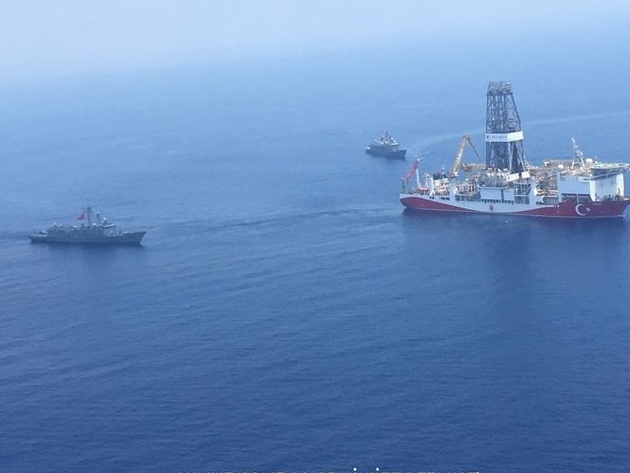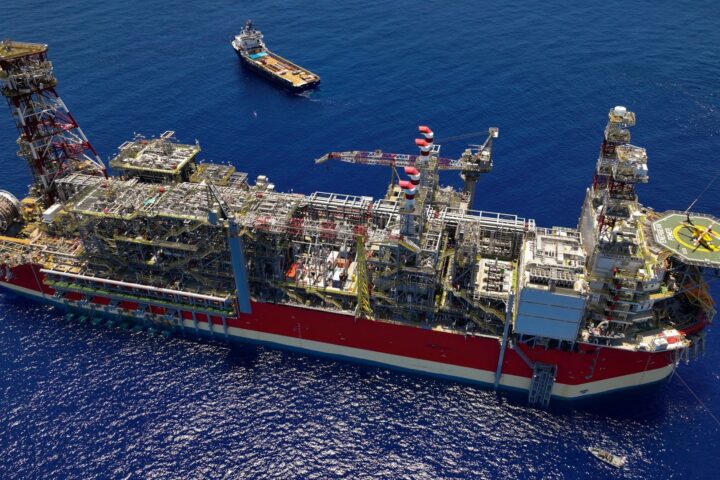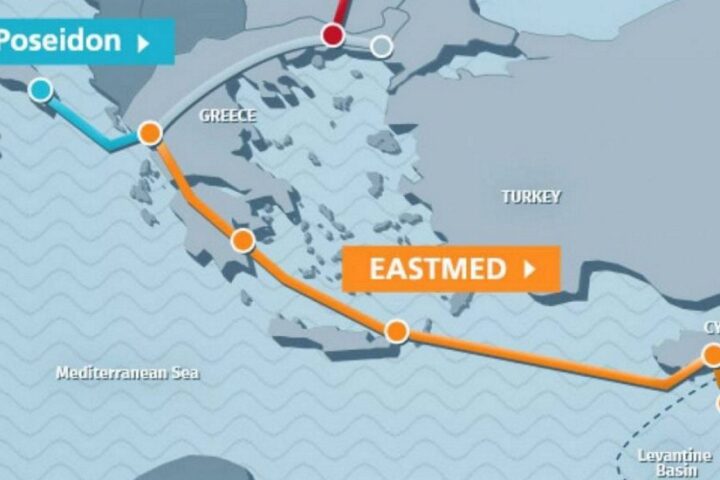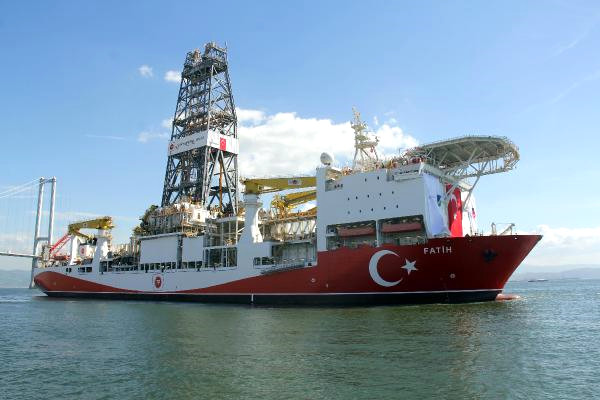By Panayiotis Tilliros
Geopolitical aspects of energy development in the Levantine basin are of enormous importance, given the power vacuum that has emerged in international relations comprising the Eastern Mediterranean and the Middle East.
That is where Erdogan plays a tough poker game with the “blue homeland” doctrine. The superpowers (US, Russia) and China with the Belt and Road Initiative (New silk road) are now openly involved in the energy game of the area.
Erdogan is playing a zero-sum game on the geopolitical chessboard, taking advantage of Greek elite Turkophobia.
Since 2018, when Turkish drilling ships violated the Exclusive Economic Zone (EEZ) of the Republic of Cyprus, Greece disappeared as a guarantor, a legal obligation under the Treaty of Guarantee that it also forgot in 1974, along with Great Britain.
Cyprus must tread firmly and wisely on the tightrope of international tensions.
If it plays a win-win game with the right alliances in the East Med energy race, Cyprus will gain substantial geopolitical leverage beyond material capabilities, rendering possible a fairer solution to the Cyprus problem and tangible economic benefits.
It requires implementing an LNG strategy based on an onshore gas liquefaction station in Vassilikos, which is undoubtedly the best monetisation and export option for Cyprus.
East Med fantasy
The East Med pipeline is an unrealistic fantasy in every respect compared to the LNG Plant, which should be the heart and soul of Cyprus’s strategic energy vision. First, no major company has expressed any investment interest in the East Med pipeline.
Second, it has recently been undermined by Greece in a way that ignores legitimate Cypriot interests.
The secret plan is still being hatched and deserves extensive analysis but let it be disclosed that it involves transiting Israeli, Qatari, Iraqi and Cypriot gas via the “Turkish Med” pipeline.
In this region of complex geopolitics and energy wars, the great energy game is being replayed with competing pipelines backed by the US, Russia and China.
Iran is also involved, while Israel, always ahead, is keeping all its options open.
The East Med pipeline proposal (which serves specific commercial interests receiving EU funding) can be kept as a communications exercise at a diplomatic level.
Cyprus’ true interests, geopolitical, economic, financial and social, lie in constructing a land-based LNG factory, given the projections of rising world demand for Liquefied Natural Gas.
First, LNG has the characteristics of oil and therefore, it can be sold in markets where there are demand and better prices.
Second, the development of the energy sector around the LNG Plant with the necessary infrastructure and ancillary industries will create thousands of high value-added jobs across the entire industry value chain that will increase GDP while diversifying the economy.
Diversification of the Cyprus economy is frequently raised by the credit rating agencies, especially after the pandemic hit the tourist sector.
Third, a dynamic energy sector will create inter-sectoral synergies, multiplier effects and economies of scale.
Fourth, it will provide a much-needed industrial base rendering the economy more competitive and less vulnerable against external shocks.
Moreover, the power generation sector will produce cheaper electricity with a greener fuel of lower energy intensity (consumption) and higher energy efficiency and productivity, contributing to a carbon-neutral, net-zero economy and EU environmental and climate change targets.
Electricity may also be sold in the future through the Pan-European electricity transmission network highways (EuroAsia and EuroAfrica interconnectors).
Lower cost
The LNG Terminal cost is lower than that of the proposed East Med pipeline and much lower investment risk.
Furthermore, the LNG Terminal combined with LNG bunkering for fuel supply to ships will help the Cypriot economy literally take off.
Finally, the LNG Plant will enable regional cooperation by creating common economic, commercial, and strategic interests.
Effective economic diplomacy is required in the East Med Gas Forum.
Israel and Egypt are taking initiatives (agreement to connect Israel’s Leviathan gas field to Egypt’s LNG plants) that constrain options and endanger Cyprus’ energy program now in a stalemate.
It is essential to muster the political will to send an immediate signal to the EU, the international community and oil and gas companies that Cyprus wants to develop existing gas discoveries (the Aphrodite, Calypso and Glaucus fields) and not just further exploration.
Sufficient infrastructure already exists at Vassilikos that will complement the liquefaction project.
Cyprus can satisfy demand anywhere and certainly in the wider Mediterranean region, and Southeastern Europe and the Balkans via the LNG import terminal in Alexandroupolis and the Interconnector Greece-Bulgaria (IGB) pipeline.
It will enhance Cyprus’ advantages of being an established maritime hub and shipping centre.
While Turkey is attempting to devour the EEZ of the Republic, reducing it to 6% of what it is entitled to under UNCLOS, Cyprus’ position on a gas pipeline to Turkey must be non-negotiable.
With an untrustworthy “partner” suffering from an anti-Hellenic syndrome and anti-Greek sentiment, a pipeline to Turkey will be a destructive outcome.
Turkey is already exerting downward pressure on the price of gas it is importing from Russia; hence it is more than evident the outcome for Cyprus with a pipeline to Turkey.
In return for rejecting a gas pipeline to Turkey, Turkey’s demand to discard the East Med pipeline project can be accepted.
Turkey can, of course, import LNG from Cyprus utilising its FSRU at Dörtyol in the annexed Syrian province of Hatay.
Turkey is not interested in immediate disbursement from the Cyprus National Investment (Hydrocarbon) Fund to benefit Turkish Cypriots.
Turkey is seeking to become an energy hub and to hold Europe hostage by controlling energy flows.
By instrumentalising the Turkish-Cypriots, Turkey aims to grab Cyprus gas reserves and gain another entry point for pipeline gas into its market from the East Med for its own use and/or transit.
Controlling energy flows through Turkish territory and seeking to become a nuclear power will help Turkey attain its goal of being accepted into the superpower club.
It is not in Europe’s interest to exchange Russian energy dependence for Turkish.
The East Med reserves of oil and gas constitute a fifth energy corridor to Europe, with a distinct and separate identity from the fourth corridor from the Caspian via Turkey (TANAP-TAP), for the security of which Turkey waged its latest war with Azerbaijan against Armenia, besides its military interventions in Syria and Libya.
Turkey’s “blue homeland” doctrine affects all regional states’ legitimate interests and, of course, antagonises broader international vested interests.
Above all, the Turkish “blue homeland” expansionist policy represents an existential threat to Greece and Cyprus.
Both states must devise an effective deterrence strategy to counteract Turkey’s coercive tactics and exit from their Thucydidean trap.
Panayiotis Tilliros is an Economist, International Relations Analyst and Expert in Economic, Financial and Energy Issues. He currently works as a senior economist at the Ministry of Finance, Cyprus










